Unit 4 i used to be afraid of the dark Section A 1a-2c
Unit 4 I used to be afraid of the dark.(讲义及作业)含答案

Unit 4 I used to be afraid of the dark. Words and Expressionshumorous /'hju:mərəs/ adj. 有幽默感的;滑稽有趣的silent /'saɪlənt/ adj.不说话的;沉默的helpful /'helpfl/ adj.有用的;有帮助的from time to time 时常;有时score /skɔ:(r)/ n.&v.得分;进球background /'bækgraʊnd/ n. 背景interview /'ɪntə(r)vju:/ v. 采访;面试n.面试;访谈Asian /'eɪʃn, 'eʒən/ adj.亚洲(人)的n.亚洲人deal /di:l/ v. (dealt /delt/, dealt) 对付;对待deal with 应对;处理shyness /'ʃaɪnəs/ n. 害羞;腼腆dare /deə/, /der/ v. 敢于;胆敢crowd /kraʊd/ n. 人群;观众ton /tʌn/ n. 吨;(pl.) 大量;许多private /'praɪvət/ adj. 私人的;私密的guard /gɑ:(r)d/ n. 警卫;看守v.守卫;保卫require /rɪ'kwaɪə(r)/ v. 需要;要求European /ˌjʊ(ə)rə'pi:ən/ adj. 欧洲(人)的n. 欧洲人African /'æfrɪkən/ adj. 非洲(人)的n. 非洲人British /'brɪtɪʃ/ adj.英国(人)的speech /spi:tʃ/ n. 讲话;发言public /'pʌblɪk/ n.民众adj. 公开的;公众的in public 公开地;在别人(尤指生人) 面前ant /ænt/ n. 蚂蚁insect /'ɪnsekt/ n. 昆虫seldom /'seldəm/ adv. 不常;很少influence /'ɪnfluəns/ v.&n.影响absent /'æbsənt/ adj.缺席;不在fail /feɪl/ v. 不及格;失败;未能(做到)examination /ɪgˌzæmɪ'neɪʃn/ n.考试;审查boarding /'bɔ:dɪŋ/ school 寄宿学校in person 亲身;亲自exactly /ɪg'zæktli/ adv. 确切地;精确地pride /praɪd/ n. 自豪;骄傲take pride in 为…感到自豪proud /praʊd/ adj. 自豪的;骄傲的be proud of 为…骄傲;感到自豪general /'dʒenrəl/ adj. 总的;普遍的;常规的n.将军introduction /ˌɪntrəˈdʌkʃn/ n. 介绍Paula /'pɔ:lə/ 葆拉(女名)Alfred /'ælfrɪd/ 艾尔弗雷德(男名)Billy /'bɪli/ 比利(男名)Candy /'kændi/ 坎迪(女名)Jerry /'dʒeri/ 杰里(男名);杰丽(女名) Emily /'emɪli/ 埃米莉(女名)Role-play the conversation.Alfred: This party is such a great idea!Gina: I agree. It’s been three years since we last saw our primary school classmates.Alfred: It’s interesting to see how people have changed.Gina: Billy has changed so much! He used to be so shy and quiet. Alfred: Yeah, his face always turned red when he talked to girls! Gina: I used to see him reading in the library every day.Alfred: That’s because he was a really good student. He studied hard and got good scores on his exams.Gina: Did he use to wear glasses?Alfred: Yes, and he used to be thin, too. But look how big andstrong he is now!Gina: He’s so popular now. Look at all the girls around him!Reading 1Read the article and identify the paragraphs in which thefollowing information appears. Number the information [1–3].____ how Candy’s li fe has changed____ Candy’s advice to young people____ Candy’s backgroundFrom Shy Girl to Pop Star1 For this month’s Young World magazine, I interviewed19-year-old Asian pop star Candy Wang. Candy told me that sheused to be really shy and took up singing to deal with hershyness. As she got better, she dared to sing in front of her class,and then for the whole school. Now she’s not shy anymore andloves singing in front of crowds.2 I asked Candy how life was different after she became famous.She explained that there are many good things, like being able totravel and meet new people all the time. “I didn’t use to bepopular in school, but now I get tons of attention everywhere Igo.” However, too much attention can also be a bad thing. “Ialways have to worry about how I appear to others, and I have tobe very careful about what I say or do. And I don’t have muchprivate time anymore. Hanging out with friends is almostimpossible for me now because there are always guards aroundme.”3 What does Candy have to say to all those young people whowant to become famous? “Well,” she begins slowly, “you haveto be prepared to give up your normal life. You can neverimagine how difficult the road to success is. Many times Ithought about giving up, but I fought on. You really require a lotof talent and hard work to succeed. Only a very small number ofpeople make it to the top.”3b Read the article again and complete the sentences about Candy.1.She used to be shy, but now she’s not shy ____________.2.She didn’t use to be ___________ in school, but now she getslots of attention.3.She used to ___________ with friends, but it is almostimpossible now.4.She didn’t use to ___________ how she appears to others, butnow she does.Grammar Focus重点句型:used to…过去常常……肯定句:I used to be short.否定句:I didn’t use to be popular in school.I usedn’t (used not) to be popular in school.疑问句:Did he use to wear glasses?—Yes, he did. / No, he didn’t.反意句:You used to be short, didn’t you?—Yes, I did. / No, I didn’t.Did she use to live in Shanghai?= Used she to live in Shanghai?Did you use to play the piano?= Used you to play the piano?—He used to drink milk, didn’t he?—Yes, he did.—No, he didn’t.—He used to drink milk, usedn’t he?—Yes, he did. / Yes, he used to.—No, he didn’t. / No, he usedn’t to.used to do sth. be used to (doing) sth. be used to do sth.She ______ live alone. But she ______ living alone because she feels lonely.A. used to; doesn’t used toB. is used to; was used toC. used to; is not used toD. was used to; doesn’t used to4a Write sentences about the past using used to.1.Grace / watch a lot of TV / watch a lot of moviesGrace used to watch a lot of TV. She didn’t use to watch a lot of movies.2.My mom / have curly hair / have straight hair____________________________________________________ __________________3.Jerry / read books on European history / read books on Africanculture____________________________________________________ __________________.4.Sandy / teach British English / teach American English____________________________________________________ __________________.Reading 2Read the passage and put the sentences [A-D] in the correctHe Studies Harder Than He Used toLi Wen is a normal 15-year-old boy from the countryside. He works very hard and does well in school. It is hard to believe that he used to have difficulties in school. When he was a little boy, he seldom caused any problems, and his family spent a lot of time together. ____________. His parents moved to the city to look for jobs, and his grandparents came to take care of him. But he missed his parents so much and he often felt lonely and unhappy.Li Wen’s unhappiness began to influence his schoolwork. He became less interested in studying. Sometimes he was absent from classes and he failed his examinations. Finally, Li Wen’s parents made the decision to send him to a boarding school. However, Li Wen was shy and was not able to make friends quickly in school. He found life there difficult. One day he told his teacher that he wanted to leave the school. _________ and she called his parents. She advised them to talk with their son in person. So his parents took a 24-hour train and a 5-hour bus ride to get to Li Wen’s school._____________. “It was exactly what I needed,” he said. “Now I understand that even though they are busy, they are always thinking of me. They take pride in everything good that I do.”After that, Li Wen’s parents hadmuch more communication withtheir son than they used to._____________. He becamemore outgoing and made somegood friends in school. He evenjoined the school basketball team and became active in many other activities. “I’m much happier now, and I work ever harder than I used to. I know my parents love me and they’re always proud of me,”says Li Wen. “It’s veryimportant for parents to be there for their children.”2e Complete the passage with the proper forms of the words and phrases in the box.Li Wen is a 15-year-old boy. He works hard and does well in school. It is hard to believe that he used to have difficulties in school. When his parents moved to the city to work, they could not be at home to _____________ him. So he became less interested in studying and _____________ classes. Then his parents ___________ to send him to a boarding school. He found life there difficult. One day he told his teacher he wanted to leave the school. His teacher advised his parents to talk with their son in person. This conversation ____________ his life. He realized that his parents would always love him, and they would _____________ everything good that he did. Now he is much happier and more outgoing than he used to be.3b Write about how you have changed. What did you use to be like? Which change is the most important one, and why?H ow I’ve Changed!My life has changed a lot in the last few years. I used to _______________________________________________________________________________ __________________.Now I’m_______________________________________________________ __________.The biggest change in my life was _________________________________________.This is the most important change because ______________________________________________________________________________________________ __________________.Self Check1 Fill in the blanks with the correct forms of the words in the1.The mother traveled for many hours to return home to talkto her child ______.2.He used to be a very quiet teenager. He remained _______most of the time and _______ talked to other people.3.If you are always _______ from class, you will _______ theexaminations.4.The teacher _______ helping his students win the Englishcompetition.5.Kate’s grandparents have had a great _______ on her.6.That British teacher is very _______. He always tells usinteresting jokes.7.People are usually _______ to give a generalself-introduction in a job _______.8.Tina played very well in the basketball game and herparents _______ her.2 What did you use to be like when you were in primaryschool? Complete these statements.I used to wear_______________________________________________________ ___.My hair used to be______________________________________________________.I used to watch_______________________________________________________ __.I used to play_______________________________________________________ ____.I used to be_______________________________________________________ _____.Exercises1. Candy told me that she ________ (以前) be really shy and________ (开始) singing to ________ (克服) her shyness.2. I ________ have much private time ________ (不再).3. She still plays the piano ________ (时常).4. It’s polite to keep our voice down ________.5. Wearing red can help you make a ________ (decide).6. 我爸爸过去常常开车上班,现在坐公交车了。
Unit 4 I used to be afraid of the dark 知识点
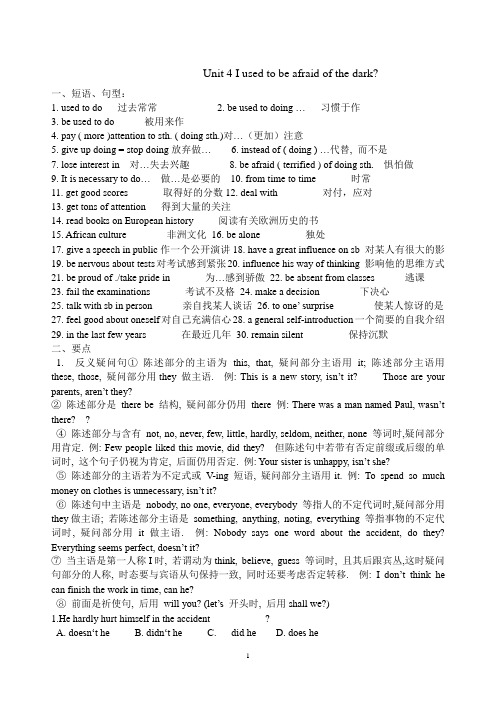
Unit 4 I used to be afraid of the dark?一、短语、句型:1. used to do 过去常常2. be used to doing … 习惯于作3. be used to do 被用来作4. pay ( more )attention to sth. ( doing sth.)对…(更加)注意5. give up doing = stop doing放弃做…6. instead of ( doing ) …代替, 而不是7. lose interest in 对…失去兴趣8. be afraid ( terrified ) of doing sth. 惧怕做9. It is necessary to do… 做…是必要的10. from time to time 时常11. get good scores 取得好的分数12. deal with 对付,应对13. get tons of attention 得到大量的关注14. read books on European history 阅读有关欧洲历史的书15. African culture 非洲文化16. be alone 独处17. give a speech in public作一个公开演讲18. have a great influence on sb 对某人有很大的影19. be nervous about tests对考试感到紧张20. influence his way of thinking 影响他的思维方式21. be proud of ./take pride in 为…感到骄傲22. be absent from classes 逃课23. fail the examinations 考试不及格24. make a decision 下决心25. talk with sb in person 亲自找某人谈话26. to one’ surprise 使某人惊讶的是27. feel good about oneself对自己充满信心28. a general self-introduction一个简要的自我介绍29. in the last few years 在最近几年30. remain silent 保持沉默二、要点1. 反义疑问句①陈述部分的主语为this, that, 疑问部分主语用it; 陈述部分主语用these, those, 疑问部分用they 做主语. 例: This is a new story, isn’t it? Th ose are your parents, aren’t they?②陈述部分是there be 结构, 疑问部分仍用there 例: There was a man named Paul, wasn’t there? ?④陈述部分与含有not, no, never, few, little, hardly, seldom, neither, none 等词时,疑问部分用肯定. 例: Few people liked this movie, did they? 但陈述句中若带有否定前缀或后缀的单词时, 这个句子仍视为肯定, 后面仍用否定. 例: Your sister is unhappy, isn’t she?⑤陈述部分的主语若为不定式或V-ing 短语, 疑问部分主语用it. 例: To spend so much money on clothes is unnecessary, isn’t it?⑥陈述句中主语是nobody, no one, everyone, everybody 等指人的不定代词时,疑问部分用they做主语; 若陈述部分主语是something, anything, noting, everything 等指事物的不定代词时, 疑问部分用it 做主语. 例: Nobody says one word about the accident, do they? Everything seems perfect, doesn’t it?⑦当主语是第一人称I时, 若谓动为think, believe, guess 等词时, 且其后跟宾丛,这时疑问句部分的人称, 时态要与宾语从句保持一致, 同时还要考虑否定转移. 例: I d on’t think he can finish the work in time, can he?⑧前面是祈使句, 后用will you? (let’s 开头时, 后用shall we?)1.He hardly hurt himself in the accident___________?A. doesn‘t heB. didn‘t heC. did heD. does he2.Let‘s search the Internet fo r some information about famous people,______?A. will youB. won‘t youC. shall we3.Eric‘s never seen a three-D movie at the cinema,_______?A.hasn‘t he B.has he C.isn‘t he D.is he4.-He didn‘t go to the meeting this morning, did he? ----______. Though he was not feeling very well. A. No, he didn‘t. B. Ye s, he did. C. No, he did. D. Yes, he didn‘t.5. —He‘s already back to Australia, _________? — _________. He is on a visit to Shanghai.A. isn‘t he; NoB. hasn‘t he; YesC. isn‘t he; YesD. hasn‘t he; No6. —She doesn‘t like geography,does she? —_________.A. Yes,she doesB. Yes,she doesn‘tC. No,she does7. He‘s flown to Hainan for a holiday, _______ he?A. isn‘tB. hasn‘tC. wasn‘t8. ---- Let‘s go skating,_______? --- OK. Let‘s go.A. do youB. don‘t youC. will youD. shall we9. –There is little milk in the milk bag, ________ there?A. isB. isn‘tC. aren‘tD. are10. Bob, you watched the fashion show last night, ________?A. weren‘t youB. didn‘t youC. haven‘t youD. won‘t you2. used to do sth. 过去常常做某事否定形式:didn’t use to do sth. / used not to do sth. 如:He used to play football after school. 放学后他过去常常踢足球。
Unit 4 I used to be afraid of the dark课文重难点讲解与练习
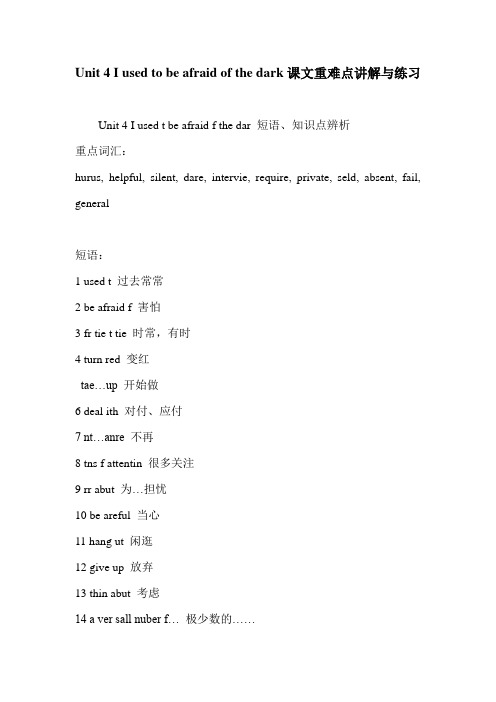
intervie v采访;面试n面试;访谈
面试进行得非常顺利。The __________ent ell
intervie既可作动词,还可作名词。
派生词:intervieern面试者;采访者intervieeen被访问者;被采访者
----i had nthing fr breafast this rning, ______________? -----___________ He gt up t late
A Had he; es B hadn’t he; es did he; N D didn’t he, N
---u didn’t g t shl, did u? ----es, I did / N, I didn’t不,我去了。/是的,我没去。
30 tae pride f为……感到自豪
31 pa attentin t对…注意,留心
32 ne f…… ……之一
33 in the last fe ears在过去的几年里
固定词组:
1 used t d sth过去常常做某事
2 be afraid f ding sth害怕做某事
3 give up ding sth放弃做某事
2 hurus ad有幽默感的;滑稽有趣的。是由hur+us(形容词后缀)构成的派生词。其名词形式:hur幽默;滑稽。
She lies telling es She is a ______________ (hur) persn in ur inds
3 She as alas silent in lass她在堂上总是很沉默。
The are ging t have an ____________ (采访) trr rning
Unit 4 I used to be afraid of the dark课文及详解

Unit 4 I used to be afraid of the dark课文及详解Unit 4 I used t be afraid f the darLanguage Gal:Tal abut hat u used t be lieSetin A1a Fill in the hart ith rds t desribe pepleAppearane 外表Persnalit 个性Tall 高个的utging 外向的straight hair 直发Funn 滑稽的,有趣的ari, u used t be shrt, didn’t u?es, I didused t和uld①used t和uld都可表示过去的习惯或行为,常可换用。
hen e ere hildren e used t/uld g sating ver inter 我们小时候每年冬天都去滑冰。
②used t含有较强的“今昔对比”的含义I d nt si s ften as I used t我不像过去那样常游泳了。
而used t则可无时间状语used t d和be used t ding①be used t 是“习惯于”某一客观事实和状态,不强调动作,t是介词,后面接名词或动名词,I a used t the eather here我已经习惯于这里的天气了。
He is used t hard r 他习惯于艰苦的工作。
②get(或bee)used t指的是从不习惯到习惯这一过程的转变,另外,它往往包含着克服困难去适应的意思。
如:u ill sn get used t the eather here你会习惯于这里的天气的。
In the end, I gt used t ding the hard r最后,我终于习惯干苦活了。
used t d sth 过去常常做某事He used t pla ftball after shl 放学后他过去常常踢足球。
Unit 4 I used to be afraid of the dark
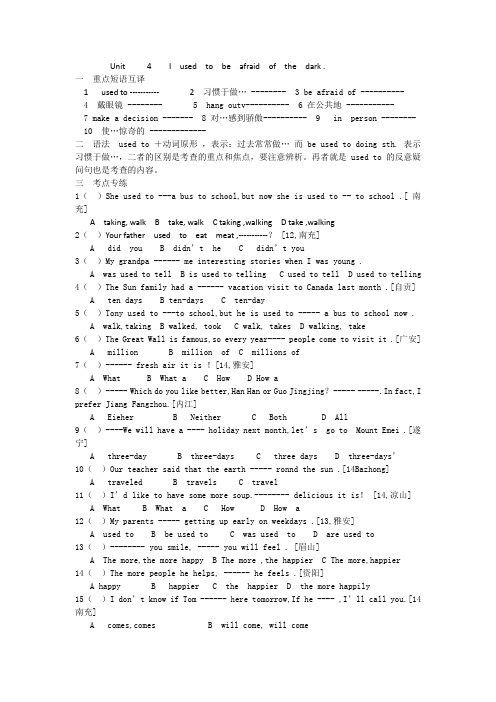
Unit 4 I used to be afraid of the dark .一重点短语互译1 used to -----------2 习惯于做… --------3 be afraid of ----------4 戴眼镜 --------5 hang outv----------6 在公共地 -----------7 make a decision ------- 8 对…感到骄傲---------- 9 in person -------- 10 使…惊奇的 -------------二语法 used to +动词原形,表示:过去常常做…而 be used to doing sth. 表示习惯于做…,二者的区别是考查的重点和焦点,要注意辨析。
再者就是used to 的反意疑问句也是考查的内容。
三考点专练1()She used to ---a bus to school,but now she is used to -- to school .[ 南充]A taking, walkB take, walkC taking ,walkingD take ,walking2()Your father used to eat meat ,-----------? [12,南充]A did youB didn’t heC didn’t you3()My grandpa ------ me interesting stories when I was young .A was used to tellB is used to tellingC used to tellD used to telling 4()The Sun family had a ------ vacation visit to Canada last month .[自贡]A ten daysB ten-daysC ten-day5()Tony used to ---to school,but he is used to ----- a bus to school now .A walk,takingB walked, tookC walk, takesD walking, take6()The Great Wall is famous,so every year---- people come to visit it .[广安]A millionB million ofC millions of7()------ fresh air it is ![14,雅安]A WhatB What aC HowD How a8()----- Which do you like better,Han Han or Guo Jingjing?----- -----.In fact,I prefer Jiang Fangzhou.[内江]A EieherB NeitherC BothD All9()----We will have a ---- holiday next month,let’s go to Mount Emei .[遂宁]A three-dayB three-daysC three daysD three-days’10()Our teacher said that the earth ----- ronnd the sun .[14Bazhong]A traveledB travelsC travel11()I’d like to have some more soup.-------- delicious it is! [14,凉山]A WhatB What aC HowD How a12()My parents ----- getting up early on weekdays .[13,雅安]A used toB be used toC was used toD are used to13()-------- you smile, ----- you will feel . [眉山]A The more,the more happyB The more ,the happierC The more,happier14()The more people he helps, ------ he feels .[资阳]A happyB happierC the happierD the more happily15()I don’t know if Tom ------ here tomorrow,If he ---- ,I’ll call you.[14南充]A comes,comesB will come, will comeC comes,will comeD will come ,comes16 ()Wang Mei used to ------- glasses .A wearingB wearC put onD putting on17 ()My sister in interested in -------- the guitar .A playingB playC to playD played18 ()Tina used to be shy ,but now she is ------ .A activeB quiteC outgoingD short19 () -------- big and strong he is now!A HowB WhatC What aD How a20 ()My brother is ----- in English ,he thinks English is very ------ .A interested;interestedB interested;interestingC interesting; interestingD interesting; interested21() There is nothing wrong with your mother,please don’t ----- her .A take pride inB pay attention toC worry aboutD listen to22() He used to --- late .But now he is used to ------ early .A sleep;get upB sleep;getting upC sleeping;get upD sleeping;getting up23 ()She -------- watch a lot of movies.A usedn’t toB didn’t use toC didn’t used toD didn’t used24 ()I used to be ---- about tests all the time,and I couldn’t sleep .A relaxedB excitedC nervousD happy25 ()Don’t worry .She is ------- to take care of little David .A carefully enoughB enough carefullyC careful enoughD enough careful26 ()The old man is -----,but he doesn’t feel ------- .A lonely;aloneB lonely;lonelyC alone;lonelyD alone;alone27 ()Tony used to --- to school,but he is used to --- to school now .A walk;taking a busB walked;took a busC walk;take a busD walking;take a bus28 ()Every year driving after drinking wine ----- a lot of traffic accidents.A happensB providesC causesD has29 () Our hometown --------- a lot in the last few years .A has changedB have changedC will changeD changed30 ()Excuse me. Could you please tell me -----------?A where can I buy the MP4B I can buy the MP4 whereC where I can buy the MP4D what can I buy三句型转换。
Unit 4I used to be afraid of the dark
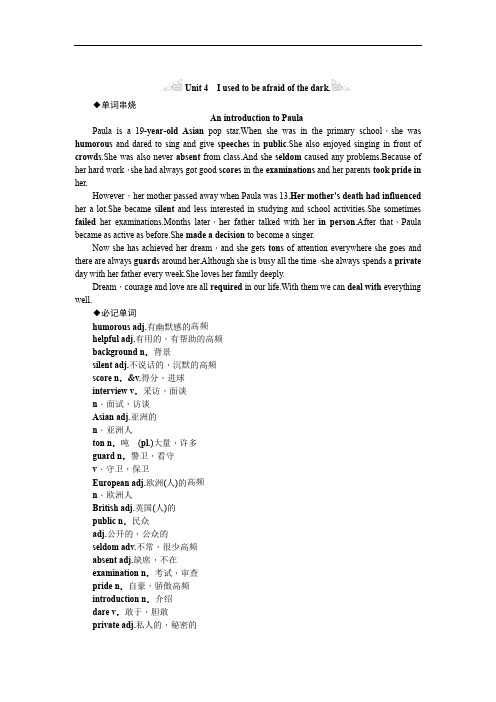
Unit 4I used to be afraid of the dark.◆单词串烧An introduction to PaulaPaula is a 19-year-old Asian pop star.When she was in the primary school,she was humorous and dared to sing and give speeches in public.She also enjoyed singing in front of crowds.She was also never absent from class.And she seldom caused any problems.Because of her hard work,she had always got good scores in the examinations and her parents took pride in her.However,her mother passed away when Paula was 13.Her mother's death had influenced her a lot.She became silent and less interested in studying and school activities.She sometimes failed her examinations.Months later,her father talked with her in person.After that,Paula became as active as before.She made a decision to become a singer.Now she has achieved her dream,and she gets tons of attention everywhere she goes and there are always guards around her.Although she is busy all the time,she always spends a private day with her father every week.She loves her family deeply.Dream,courage and love are all required in our life.With them we can deal with everything well.◆必记单词humorous adj.有幽默感的高频helpful adj.有用的,有帮助的高频background n.背景silent adj.不说话的,沉默的高频score n.&v.得分,进球interview v.采访,面谈n.面试,访谈Asian adj.亚洲的n.亚洲人ton n.吨(pl.)大量,许多guard n.警卫,看守v.守卫,保卫European adj.欧洲(人)的高频n.欧洲人British adj.英国(人)的public n.民众adj.公开的,公众的seldom adv.不常,很少高频absent adj.缺席,不在examination n.考试,审查pride n.自豪,骄傲高频introduction n.介绍dare v.敢于,胆敢private adj.私人的,秘密的require v.需要,要求African adj.非洲(人)的n.非洲人speech n.讲话,发言ant n.蚂蚁influence v.&n.影响fail v.不及格,失败,未能(做到)高频exactly adv.确切地,精确地general adj.总的,普遍的n.将军◆重点短语from time to time时常,有时高频deal with对待,对付高频take pride in为……感到自豪高频take up开始从事(某事)高频tons of许多,大量be absent from缺席even though即使高频be afraid of害怕in public公开地高频in person亲身,亲自高频be proud of为……骄傲高频all the time总是,一直hang out闲逛make a decision做决定高频used to过去常常◆词形变换humorous adj.→humor n.幽默高频helpful adj.→help v. & n.帮助,帮忙silent adj.→silence n.沉默高频Asian adj. & n.→Asia n.亚洲高频European adj. & n.→Europe n.欧洲高频African adj. & n.→Africa n.非洲高频British adj. & n.→Britain n.英国absent adj.→absence n.缺席exactly ad v.→exact adj.精确的pride n.→proud adj.骄傲的,自豪的高频introduction n.→introduce v.介绍◆重点句子1.She was never brave enough to ask questions.她从来不够勇敢地去问问题。
Unit 4 I used to be afraid of the dark(人教版)
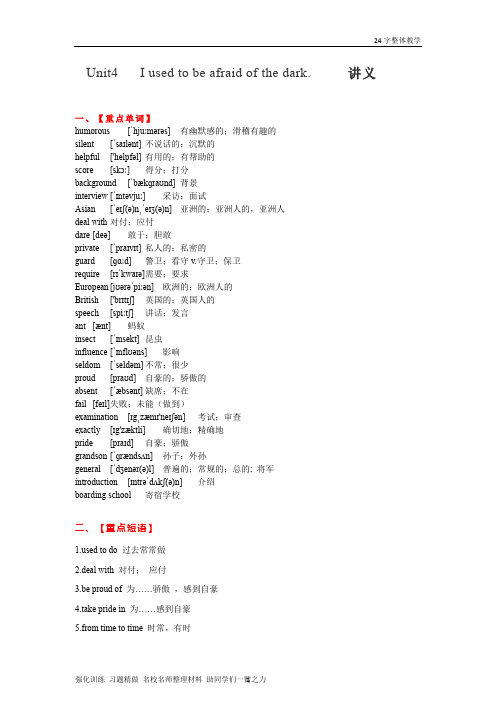
Unit4 I used to be afraid of the dark.讲义一、【重点单词】humorous[ˈhjuːmərəs]有幽默感的;滑稽有趣的silent[ˈsaɪlənt]不说话的;沉默的helpful['helpfəl]有用的;有帮助的score[skɔː]得分;打分background[ˈbækɡraʊnd]背景interview[ˈɪntəvjuː]采访;面试Asian[ˈeɪʃ(ə)nˌˈeɪʒ(ə)n]亚洲的;亚洲人的,亚洲人deal with对付;应付dare[deə]敢于;胆敢private[ˈpraɪvɪt]私人的;私密的guard[ɡɑːd]警卫;看守v.守卫;保卫require[rɪˈkwaɪə]需要;要求European[jʊərəˈpiːən]欧洲的;欧洲人的British['brɪtɪʃ]英国的;英国人的speech[spiːtʃ]讲话;发言ant[ænt]蚂蚁insect[ˈɪnsekt]昆虫influence[ˈɪnflʊəns]影响seldom[ˈseldəm]不常;很少proud[praʊd]自豪的;骄傲的absent[ˈæbsənt]缺席;不在fail[feɪl]失败;未能(做到)examination[ɪgˌzæmɪ'neɪʃən]考试;审查exactly[ɪg'zæktli]确切地;精确地pride[praɪd]自豪;骄傲grandson[ˈɡrændsʌn]孙子;外孙general[ˈdʒenər(ə)l]普遍的;常规的;总的; 将军introduction[ɪntrəˈdʌkʃ(ə)n]介绍boarding school寄宿学校二、【重点短语】ed to do 过去常常做2.deal with 对付;应付3.be proud of 为……骄傲,感到自豪4.take pride in 为……感到自豪5.from time to time 时常,有时6.in public 公开地7.in person 亲身,亲自8.take up sth 开始做,接受,占用9.not…anymore 不再10.worry about 为……担忧11.hang out 闲逛12.think about 考虑13.be alone 独处14.on the soccer team 在足球队15.no longer 不再16.make a decision 做决定17.to one’s surprise 令某人吃惊的是18.even though 尽管19.pay attention to 对……注意,留心20.in the last few years 在过去的几年里21.be afraid of 害怕22.turn red 变红23.get tons of attention 被众人所关注;吸引无数目光24.be careful 当心25.give up 放弃26.a very small number of …极少数的……27.give a speech 作演讲28.all the time 一直总是29.be interested in 对……感兴趣30.change one’s life 改变某人的生活31.take care of 照顾32.be able to do sth. 能够,有能力做某事33.g e t g o o d s c o r e s取得好成绩34.be absent from缺席35.i t’s h a r d t o b e l i e v e t h a t...很难相信……36.建议某人做某事 a d v i s e s b t o d o s t h三、【重点句型】1. I used to be afraid of the dark.我过去常常害怕黑暗。
Unit 4 I used to be afraid of the Dark单元知识盘点

单元知识盘点
常用短语
used to 过去常常;以前经常 be afraid of 害怕 be interested in 对……感兴趣 from time to time 时常;有时 see sb. doing sth. 看到某人正在做某事 take up 开始从事 deal with 应对;处理
谢 谢 观 看!
本课件仅供交流学习使用,严禁用于任何商业用途
全品大讲堂
英语
九年级全一册(上)
新课标(RJ)
Unit 4 I used to be afraid of the Dark.
单元知识盘点
Unit 4 I used to be afraid of the Dark.
单元知识盘点
常用短语 经典句型 语法点睛 课文再现
What makes the problem boy change?
Before talking
He felt 1. lonely and unhappy
He was 2.
absent
He 3.
failed
. from classes. his examinations.
单元知识盘点
After talking
He has become more outgoing.
He has made 4. some good friends in school.
He studies harder than 5.
he used to
.
Model Li Wen used to be a problem boy, but now he has changed a lot. Before talking with his parents, he used to…After talking with his parents, he…
Unit 4 I used to be afraid of the dark重点知识归纳

Unit 4 I used to be afraid of the dark重点知识归纳Unit 4 I used to be afraiddark. 重点知识归纳解析【重点单词】1. humorous adj. 有幽默感的;图2. silent adj. 沉默的;lpful adj. 有用的,有帮助的:v. 得分,进球。
view v n. 面试,采访;dare v. 敢于;胆敢;vate adj. 私人的,私密的。
quire v. 需要;要求;uropean adj. 欧洲的;10. British adj. 英国的;讲话;发言;12. ant n. 蚂蚁;昆虫luence n v 影响;ud adj. 自豪的,骄傲的;ldom adv. 不常,很少;ail v.不及格,失败;general adj. 普通的,常规的;du介绍;【重点词组】used to过去曾经2. be afraiddark惧怕黑暗时常get good scores取得好的分数deal with对付,应对ga得到大量的关注ad buropea阅读有关欧洲历史的书African culture非洲文化be alone独处10. give aublic作一个公开演讲aures画画12. be nervous abou对考试感到紧张luwag影响他的思维方式be proud of ./take pride in 为…感到骄傲be ablasses逃ail the examinations考试不及格ake a decision下决心alk with sb亲自找某人谈话’ surprise使某人惊讶的是20. feel good about oneself对自己充满信心21. a general self-introduction一个简要的自我介绍22last few years在最近几年23. remain silent 保持沉默24. have a great influb 对某人有很大的影响【重点句式】---You used to bdidn’t you? ---Yes, I did.---你过去个子矮,是吗?---是的,我是。
Unit 4 I used to be afraid of the dark课文及详解

Unit 4 I used to be afraid of the dark课文及详解Unit 4 I used to be afraid of the dark Language Goal: Talk about what you used to be likeSection A 1a Fill in the chart with words to describe people. Appearance 外表 Personality 个性 Tall 高个的 Outgoing 外向的 straight hair 直发 Funny 滑稽的,有趣的 Mario, you used to be short, didn’t you? Yes, I did. used to和would ①used to 和would都可表示过去的习惯或行为,常可换用。
When we were children we used to/would go skating very winter. 我们小时候每年冬天都去滑冰。
②used to含有较强的“今昔对比”的含义 I do not swim so often as I used to我不像过去那样常游泳了。
而used to则可无时间状语used to do和be used to doing. ①be used to 是“习惯于”某一客观事实和状态,不强调动作,to是介词,后面接名词或动名词, I am used to the weather here.我已经习惯于这里的天气了。
He is used to hard work. 他习惯于艰苦的工作。
②get(或become)used to指的是从不习惯到习惯这一过程的转变,另外,它往往包含着克服困难去适应的意思。
如:You will soon get used to the weather here.你会习惯于这里的天气的。
Unit 4 I used to be afraid of the dark
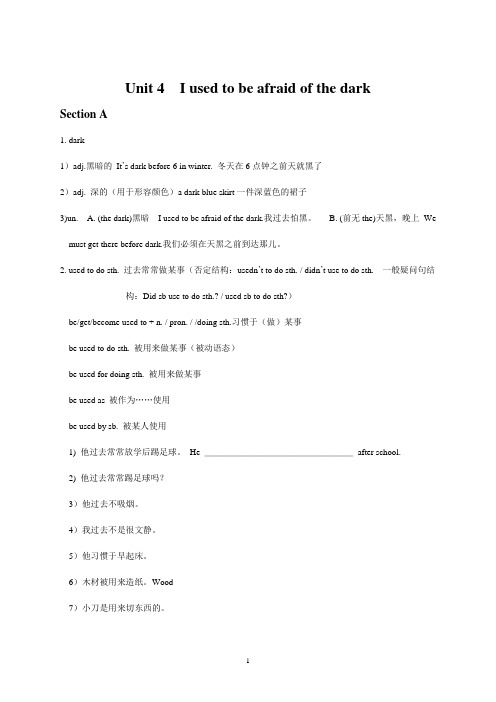
Unit 4 I used to be afraid of the darkSection A1. dark1)adj.黑暗的It’s dark before 6 in winter. 冬天在6点钟之前天就黑了2)adj. 深的(用于形容颜色)a dark blue skirt一件深蓝色的裙子3)un. A. (the dark)黑暗I used to be afraid of the dark.我过去怕黑。
B. (前无the)天黑,晚上We must get there before dark.我们必须在天黑之前到达那儿。
2. used to do sth. 过去常常做某事(否定结构:usedn’t to do sth. / didn’t use to do sth. 一般疑问句结构:Did sb use to do sth.? / used sb to do sth?)be/get/become used to + n. / pron. / /doing sth.习惯于(做)某事be used to do sth. 被用来做某事(被动语态)be used for doing sth. 被用来做某事be used as 被作为……使用be used by sb. 被某人使用1) 他过去常常放学后踢足球。
He _________________after school.2) 他过去常常踢足球吗?3)他过去不吸烟。
4)我过去不是很文静。
5)他习惯于早起床。
6)木材被用来造纸。
Wood7)小刀是用来切东西的。
3. Don’t you remember me? 你不记得我了吗?(否定疑问句.根据事实回答)Yes, I do. 不, 我记得. No, I don’t 是的, 我不记得了4. wait a minute 等一等5. be more interested in 对…更感兴趣.6. be on the swim team = be a member of the swim team 在游泳队效力(是游泳队队员)7. sure1) adj.“确信的,确实的,一定……的”①be sure of sth确信某事②be sure+that从句:确信……③be sure to do sth必定会做某事2) adv ①无疑,确实②好,当然,没问题(用于应答)A.他深信自己会成功。
UNIT4 I used to be afraid of the dark
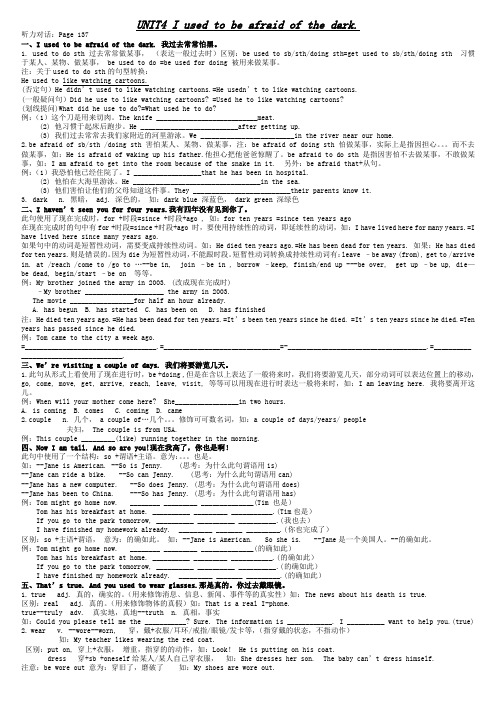
UNIT4 I used to be afraid of the dark.听力对话:Page 137一、I used to be afraid of the dark. 我过去常常怕黑。
1. used to do sth 过去常常做某事,(表达一般过去时)区别:be used to sb/sth/doing sth=get used to sb/sth/doing sth 习惯于某人、某物、做某事, be used to do =be used for doing 被用来做某事。
注:关于used to do sth的句型转换:He used to like watching cartoons.(否定句)He didn’t used to like watching cartoons.=He usedn’t to like watching cartoons.(一般疑问句)Did he use to like watching cartoons? =Used he to like watching cartoons?(划线提问)What did he use to do?=What used he to do?例:(1)这个刀是用来切肉。
The knife ___________________________meat.(2) 他习惯于起床后跑步。
He __________________________after getting up.(3) 我们过去常常去我们家附近的河里游泳。
We _________________________in the river near our home.2.be afraid of sb/sth /doing sth 害怕某人、某物、做某事,注:be afraid of doing sth 怕做某事,实际上是指因担心。
而不去做某事,如:He is afraid of waking up his father.他担心把他爸爸惊醒了。
unit 4 I used to be afraid of the dark.

单词
单词
1. 介绍 2.欧洲(人)的;欧洲人 3. 确切地;精确地 4.缺席,不在 5. 英国(人)的 6.考试,审查 7.讲 话,发言 8.不常,很少 9.非洲 (人)的;非洲人 10.不及格,失败; 未能做到 11.总的;普遍的;常规的; 将军 12.寄宿学校 13.影响 14.蚂 蚁 15.民众;公开的,公众的 16. 亲身,亲自 17.昆虫 18.为…感到骄 傲
反意疑问句:
一:反意疑问句提出情况和看法,问对方是否同 意的句子。 一般由两部分组成: 1.肯定的陈述句+否定的简略问句? 2.否定的陈述句+肯定的简略问句? (简略问句的构成:be/助动词/情态v.+代词 (与主语对应的人称代词)?) isn’t it e.g. 1. Beijing is a beautiful place, ________? will you 2. You won’t be away for long, ________?
二:如果陈述部分是否定时,要注意英语回答和 汉语回答的区别. e.g. ---You are not going out today, are you? --- Yes, I am. (不,我今天要出去) No, I am not. (是的,我今天不出去) 三:陈述句为there be句型时,简略问句中重复使 用there(而不是与主语对应的人称代词)。 e.g. There will be a meeting tomorrow, won’t d to:
UNIT4Iusedtobeafraidofthedark
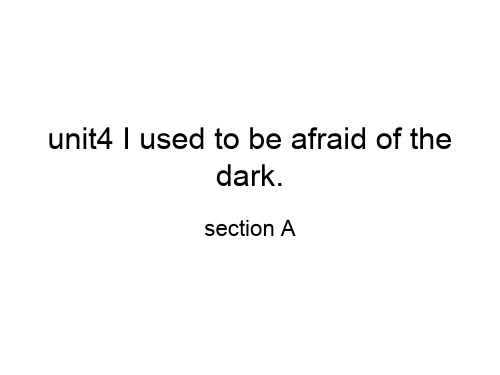
• in front of 在...前面(不包括在内) • in the front of 在...前面(包括在内)
• whole 形容词 整个的,全部的
• 比较:
• the(冠词/所有格/其他限定词)+whole+名词单 数形式
• all+冠词/所有格/其他限定词
• 注意:1.如果没有冠词或其他的限定词,whole不 能和单数名词连用
section A
• 一.反意疑问句遵循原则:前肯后否 前否后肯 前 后两句型必须保持一致
• 例如:You are a student,aren't you?
•
你是个学生,对吗?
• 1.反意疑问句的回答:
• A.陈述部分是肯定 答语意思不变
• 例如:He enjoys singing,doesn't he?
2.名词 影响,作用 have an influence on sb.对某人有影响
• 三.be proud of 为...骄傲/感到自豪 • proud 形容词 骄傲的,自豪的 • pride 名词 骄傲,自豪 • be proud to do sth.为做某事感到骄傲/自豪 • 四.cause 动词 导致,使发生 • cause problems=cause trouble 惹麻烦,引
•
2.whole一般不与不可数名词及物质名词连用
• 例如:the whole money(错误)或the whole bread(错误)
• 应该说:all the money或all the bread
• 十四.not...anymore(any more) = no more 不再
• crowd 1.名词 人群,观众
Unit 4 I used to be afraid of the dark 知识详解

Unit 4 I used to be afraid of the dark.我过去害怕黑暗.知识详解Section AMario, you used to be short, didn't you?马里奥,你过去很矮,不是吗? (教材P25 1a) used to do sth.过去常常做某事讲该用法表示过去经常发生的事情或存在的状态,通常不与表示过去的时间状语连用.used不随人称和时态的变化而变化.»There used to be a clothes store around the street corner.街角处曾经有一家服装店.»Photos used to be expensive, and people took fewer of them.照片过去很贵,人们拍得很少.反意疑问句讲本句是反意疑问句.反意疑问句的两种基本形式:肯定的陈述句+否定的附加问句否定的陈述句+肯定的附加问句特别提醒(1)陈述句和附加问句在人称、数和时态上必须保持一致,且附加问句的主语通常为人称代词的主格形式.(2)陈述句部分含有nothing、never、hardly、little(不多的)等表示否定意义的词时,附加问句要用肯定形式. »There is little money for Mr. Lee to buy a ticket for today's show, is there?李先生几乎没有钱买今天的演出票,是吗?拓反意疑问句的答语:(1)反意疑问句的答语应符合事实.事实是肯定的,用yes;事实是否定的,用no.(2)当反意疑问句是”前否后肯”的结构时,其答语的翻译要以事实为依据,yes翻译为”不”,no翻译为“是的”.»-Tom likes listening to music, doesn't he?汤姆喜欢听音乐,不是吗?Yes, he does.是的,他喜欢.»-He didn't come to school yesterday, did he?他昨天没来学校,是吗?-Yes, he did.不,他来学校了.-No, he didn't.是的,他没有来学校.巧学妙记反意疑问句反意疑问三要点,前后谓语正相反;短句not如出现,必须缩写是习惯;最后一点应注意,短句主语代词填;回答反意疑问句,答案含义是依据;肯定事实用yes 否定事实就用no.典例1 (龙东中考)-It is rude to ask direct questions,________?-Yes, but I think it's OK to your close friends.A. isn't itB. doesn't itC. does it解析:问句句意:问直接的问题是粗鲁的,不是吗?反意疑问句遵循”前肯后否,前否后肯”的原则,由前面的It is可知,附加问句应为isn't it.故选A.What's he like now?他现在什么样? (教材P25 1c) What+ be+ sb. like?讲可用来询问人的相貌,也可用来提问人的性格、品质等.»-What is your math teacher like?你的数学老师长什么样?-He is tall and thin.他又高又瘦.»-What's he like?他是个什么样的人?-He's outgoing.他很外向.拓(1)" What do/does + sb. +look like?"意为“某人长什么样?”,常用来提问人的相貌.»-What does your elder sister look like?你姐姐长什么样?-She is of medium build with short hair.她中等身材,留着短发.(2)"What do/does +sb.+like?"意为”某人喜欢什么?”,用来询问某人的喜好.»-What does Tom like?汤姆喜欢什么?-He likes collecting stamps.他喜欢集邮.humorous 有幽默感的(教材P26 2a) humorous/'hju:mərəs/adj.有幽默感的;滑稽有趣的讲由”humor(n.幽默)+-ous(形容词后缀)”构成,在句中可作表语或定语.»-What is Ricky like?里基怎么样?»-He's humorous. He often tells us funny jokes.他很幽默,他经常给我们讲滑稽的笑话.»Most teenagers like humorous TV shows.大多数青少年喜欢幽默的电视节目.拓humor n. 幽默humorous adj.有幽默感的;滑稽有趣的humorless adj.无幽默感的humorist n.诙谐风趣的人语境串记Our teacher is a humorist. He has a good sense of humor. He always tells us humorous stories, but today's story is humorless.我们的老师是一个诙谐风趣的人.他很有幽默感.他总是给我们讲幽默故事,但是今天的故事不幽默. 词缀学习-ous 是常见的形容词后缀,通常放在名词后,表示”有······性质的”.danger(n.危险)+-ous→ dangerous(adj.有危险的)silent 沉默的(教材P26 2a) silent/'sailənt/adj.不说话的;沉默的讲在句中作表语或定语.remain/stay/keep silent 保持沉默»I don't like the silent hours of the night.我不喜欢晚上寂静的时间.»Please look at the sign. It says "Keep silent",请看告示牌.上面写着”保持安静”.拓silent adj.silently adv.安静地;沉默地silence n.[U]沉默;寂静in silence安静地(=silently)»A scream broke the silence of the night.一声尖叫划破了寂静的夜晚.»Peter sat on the square silently, tears coming up in his eyes.彼得静静地坐在广场上,眼泪夺眶而出.»They walked on in silence for a while.他们默默地继续走了一会儿.典例2用括号中所给单词的适当形式填空.(2022·龙东中考)Sally is my best friend. She often sits beside me_______ (silent) when I am sad.解析:句意;萨莉是我最好的朋友.当我难过的时候,她经常静静地坐在我身边.此处应用副词形式修饰动词sits,故填silently.helpful 有帮助的(教材P26 2a) helpful/'helpfl/adj.有用的;有帮助的讲由”help(n.帮助)+-ful(形容词后缀)”构成.be helpful to sb.对某人有帮助»Can you give us a helpful suggestion? 你能给我们提一个有用的建议吗?拓(1)[形容词]乐于助人的»Millie is helpful and she gets along well with her classmates.米莉乐于助人,她和同学们相处得很好.(2) helpful adj. 有用的;有帮助的反义词helpless adj.无助的helpfully adv. 有用地;有帮助地反义词helplessly adv.无助地helpfulness n.帮助;有用反义词helplessness n无助典例3 用括号中所给单词的适当形式填空.(2022·盘锦中考)I hope this excellent report will be________ (help) in answering your question.答案:helpfulIt's been three years since we last saw our primary school classmates.自从上次我们小学同学见面已经三年了. (教材P26 2d) since 引导的时间状语从句讲本句是含有since引导的时间状语从句的复合句.since在此处作连词,意为”自······以后;从·····以来”.since 引导的时间状语从句常用一般过去时,与其对应的主句常用现在完成时.»They have been friends since they first met.他们自从第一次见面就一直是朋友.拓(1)since[连词]既然;因为引导原因状语从句.»Since you have drunk so much wine, you mustn't drive.既然你喝了这么多酒,那就绝对不能开车.(2)since[介词]自······以后;从······以来后接表示时间的词或短语.»The factory has been here since the 1990s.这家工厂自20世纪90年代以后就在这里了.典例4(2022·十堰中考)Since he was a little boy, he________ in love with music.A. isB. wasC. has beenD. had been解析:句意;他从小就爱上了音乐.本句是含有since引导的时间状语从句的复合句,从句用一般过去时,主句通常用现在完成时,故选C.I used to see him reading in the library every day.我过去常常看到他每天在图书馆看书. (教材P26 2d) see sb. doing sth.看见某人正在做某事辨see sb. doing sth.与se sb.do sth.语境串记I often see Li Ming play basketball with his friends on the playground, but I saw him running alone when I passed by just now.我经常看见李明和他的朋友们在操场上打篮球,但我刚才经过的时候,看见他一个人正在跑步.拓与see用法类似的词还有hear(听见)、watch(观看)、feel(感到)和notice(注意到)等.He studied hard and got good scores on his exams.他学习努力并且在考试中取得了好成绩. (教材P26 2d) score/sko:(r)/n.&v.得分;进球讲score[名词](考试中的)分数,成绩(相当于grade) (游戏或比赛中的)得分,比分[动词](在游戏、比赛或考试中)得分»Through her hard work, she entered Jilin University with a high score of 615 marks in 2011.通过努力,她在2011年以615分的高分考入吉林大学.»The final score was two-zero.最终的比分为2:0.»Great cheers went up when he scored in the last minute of the game.当他在比赛的最后一分钟得分时,全场爆发出了热烈的欢呼声.»She scored 98 in the French exam.她在法语考试中得了98分.For this month's Young World magazine, I interviewed 19-year-old Asian pop star Candy Wang.为了这个月的《青年世界》杂志,我采访了19岁的亚洲流行歌星王坎迪. (教材P27 3a) interview/'intə(r)vju:/v.采访;面试n.面试;访谈讲(1)[动词]采访;面试interview sb. for sth.为某事采访/面试某人interview sb. about sth.就某事采访某人;就某事与某人面谈»These days we are interviewing some students for the coming art festival.这些天我们在为即将到来的艺术节采访一些学生.»We interviewed Mike about his own cooking.我们就迈克的厨艺采访了他.(2)[名词]面试;访谈»After Su Yiming won his silver medal, his father received an interview.在苏翊鸣获得银牌后,他的父亲接受了采访.»My interview for the job is tomorrow,我的求职面试在明天.拓interviewer n.采访者;主持面试者Interviewee n.被采访者;参加面试者19-year-old 19岁的讲基数词-year-old为复合形容词,意为“······岁的”.词与词之间必须加连字符”;year用单数形式.该复合形容词通常用在名词前作定语.»During the past summer vacation, a 15-year-old boy made a model plane on his own in less than a month.在过去的暑假期间,一个15岁的男孩在不到一个月的时间里独自制作了一架飞机模型.典例5找出句子中的错误并改正.John is a 13-years-old schoolboy.____________________________________________________________________________________________ 解析:分析句子可知,此处表示”约翰是一个13岁的在校男孩”,schoolboy前应用形容词.表示”······岁的”的形容词形式为”基数词-year-old", year 用单数形式,故把”13-years-old"改为”13-year-old"Asian adj.亚洲(人)的n.亚洲人讲(1)[形容词]亚洲(人)的»How many Asian countries have taken part in the sports meeting?有多少亚洲国家参加了这次运动会?»How is the Asian foot type different from westerners'?亚洲人的脚型和西方人的有什么不同?(2)[可数名词]亚洲人»I saw two Asians at school yesterday.我昨天在学校看见了两个亚洲人.拓(1)Asia[名词]亚洲»China is in Asia.中国位于亚洲.(2)典例6(达州中考)China is________ Asian country, while France is________ European country.A. an; aB. a; anC. an; anD. a; a解析:句意:中国是一个亚洲国家,而法国是一个欧洲国家.Asian的发音以元音音素/ei/开头,其前应用不定冠词an; European的发音以辅音音素/j/开头,其前应用不定冠词a.故选A.Candy told me that she used to be really shy and took up singing to deal with her shyness.坎迪告诉我她过去非常害羞,于是她开始用唱歌来克服她的羞怯. (教材P27 3a) take up 学着做;开始做讲后常跟名词、代词或动词-ing形式作宾语.take up doing sth.开始做某事»They have taken up golf.他们开始学起打高尔夫球来了.»He took up farming two years ago.他两年前开始务农.拓take up 还可意为”占据(空间);占用(时间)”.»The new fridge takes up too much room.新冰箱占据了太多空间.»Stop playing computer games. It takes up too much of your time.别玩电脑游戏了,它占用了你太多时间.典例7 (2023·武汉市江岸区期中)-Every student is expected to_______ a sporting activity for a healthy life.-I couldn't agree more. Health matters a lot.A. deal withB. end upC. take upD. come across解析:句意:”为了健康的生活,每个学生都应该参加体育活动.”“我非常赞同,健康至关重要.”deal with"处理”;end up"结束”;take up“学着做,开始做,占据”;come across"(偶然)遇见”.故选C.deal with 应对;处理讲同义词组是do with,但deal with 与how搭配,do with与what搭配.»How should I deal with this problem?=What should I do with this problem?我该怎样处理这个问题?典例8根据句意及汉语提示填写单词.(2022·无锡中考)It's necessary for us to learn how to_______ (处理)with the stress in our daily life.解析:句意:对我们而言,学会如何应对我们日常生活中的压力是非常有必要的.空处与how to 搭配构成”特殊疑问词+动词不定式”,to后应接动词原形;表示”处理”可用deal with 或do with,结合how 可知应用deal with.故填deal.shyness/'fainəs/n.害羞;腼腆讲[名词]由”shy(adj.羞怯的)+-ness(名词后缀)”构成.»Jenny is a girl with a little shyness.珍妮是一个有点儿腼腆的女孩.As she got better, she dared to sing in front of her class...随着她的进步,她敢在全班同学面前唱歌了······(教材P27 3a) dare/dea/,/der/v.敢于;胆敢讲[实义动词]有人称和时态的变化,一般不用于进行时.dare to do sth."敢于做某事”,其否定句和疑问句的构成要借助于助动词do/does/did.»The little girl doesn't dare to ask questions.这个小女孩不敢问问题.拓[情态动词]后接动词原形,常用于否定句或疑问句.»I daren't speak in public.我不敢在公共场合讲话.»Dare she go out alone at night?她晚上敢独自外出吗?in front of 在······前面辨in front of 与in the front of语境串记Jack sits in the front of a red car, and there is a yellow cat in front of the car.杰克坐在一辆红色汽车的前面,而且车前有一只黄猫.in the front of(在内部的前面) in front of(在外部的前面)Now she's not shy anymore and loves singing in front of crowds.现在,她不再害羞了,并且喜欢在众人面前唱歌. (教材P27 3a) not.+ .anymore 不再辨not…anymore 与not…any longer»From then on Rose wasn't scared of snakes anymore,从那时起,罗丝再也不害怕蛇了.»I can't wait for her any longer because I'm going to be late.我不能再等她了,因为我快要迟到了.crowd n.人群;观众»When he lands, the crowd cheers loudly.当他落地时,人群高声欢呼.»Thousands of people crowded the street.成千上万的人挤在街上.»We all crowded round the table.我们都挤在桌子周围.»People always offer their seats to old people on a crowded subway or bus.在拥挤的地铁或公共汽车上,人们总是给老人让座.»Tom and Dick are playing chess, with a crowd of students watching them.汤姆和迪克正在下国际象棋,一群学生在围观.However, too much attention can also be a bad thing.然而,太多的关注也可能是一件坏事. (教材P27 3a) too much 太多辨too much, too many 与much too»Eating too much sweet food will make people get fat.吃太多甜食会使人发胖.»You worry too much.你过于担心了.»There are too many mistakes in this composition.这篇作文错误太多.»It won't be much too long before he comes back.要不了太长时间他就回来了.巧学妙记too many要记住,其后名词必复数;too much, much too,用法区别在尾部;much后跟不可数,too后可跟形或副.And I don't have much private time anymore.我不再有许多的私人时间. (教材P27 3a) private/'praivat/adj.私人的;私密的讲[形容词]同义词为personal.»Don't let out your private information online.不要在网络上泄露你的私人信息.拓[名词]in private 私下地;单独地»We can talk about this matter in private.我们可以私下谈论这件事.谚Admonish your friends in private; praise them in public.明赞朋,暗谏友.典例9(2022·无锡中考)-Cindy, can I look at your notebook? It looks special.-Sorry. I usually write down something_______ in it.A. perfectB. practicalC. pleasantD. private解析:句意:”辛迪,我可以看一下你的笔记本吗?它看起来很特别.”“抱歉.我通常在上面写一些私人的东西.”perfect"完美的”;practical"实际的”;pleasant"令人愉快的”;private"私人的”.根据”Sorry"可知,此处表示婉拒,说明笔记本上写有一些私人的东西.故选D.Hanging out with friends is almost impossible for me now because there are always guards around me.现在与朋友们外出对我来说几乎是不可能的,因为老有警卫守在我的周围. (教材P27 3a) guard/ga:(r)d/ n.警卫;看守v.守卫;保卫讲(1)[可数名词]警卫;看守»He works as a security guard in a company.他在一家公司当保安.(2)[及物动词]守卫;保卫guard against sth.防止/防范/提防某事»The dog was guarding its ower's luggage.狗在守护着主人的行李.»We need to guard against any possible danger around us.我们需要防范周围任何可能的危险.hang out 闲逛»Last Sunday, my elder sister and I hung out in the shopping mall.上周日,我和我姐姐在购物中心闲逛.拓hang的其他常见短语:hang on抓紧;等一下hang up 挂断电话hang together同心协力hang back留下you have to be prepared to give up your normal life 你必须准备好放弃你正常的生活(教材P27 3a) be prepared to do sth.准备好做某事讲其中prepared 为形容词,意为”准备好;有所准备”.be prepared for sth."为······做好准备”.»We are not prepared to accept these conditions.我们还没准备好接受这些条件.»We have to be prepared for any difficulty.我们必须为任何困难做好准备.拓prepare[动词]使做好准备;把······预备好;使(自己)有准备prepare for...为······做好准备prepare sth.for sb.为某人准备好某物prepare oneself for sth.使某人自己为某事做好准备prepare to do sth.准备做某事»Prepare for the worst, hope for the best, and be unsurprised by everything in between.做最坏的打算,抱最好的希望,对两者之间的一切都不感到惊讶.»Mom prepared a big lunch for us.妈妈为我们准备了一顿丰盛的午餐.»See your sleep as the time you need in order to prepare yourself for an energetic tomorrow.将睡眠时间视为你为迎接精力充沛的明天所需的时间.»We're preparing to go on vacation.我们正准备去度假.give up 放弃讲“动词+副词”型短语,后接名词、代词或动词-ing作宾语.名词作其宾语时可以放在两者之间或up之后,代词作其宾语时只能放在give与up之间.»Don't give up the things that belong to you.属于你的东西不要放弃.»Drinking was harmful to his health, so he gave it up.喝酒有害健康,所以他戒掉了.»You ought to give up smoking.你应该戒烟.典例10根据所给汉语和提示词完成句子.(恩施州中考)人们告诫”后浪”(年轻一代),如果他们不努力,世界就会失去希望.(give)The younger generation are told that if they____________ efforts, the world will lose hope.答案:give up makingYou really require a lot of talent and hard work to succeed.你真的需要很多天赋和努力才能成功.(教材P27 3a) Require v.需要;要求讲通常不用于进行时.常用搭配:require sth.需要某物require sb.to do sth.要求某人做某事(sth.)require doing(某事/物)需要······require+ that从句需要·····»If you require strength in either your body or your mind, red may be of some help to you.如果你需要身体或思想上的力量,红色或许对你有些帮助.»The teacher required Tom to keep quiet.老师要求汤姆保持安静.»The car requires washing.这辆汽车需要清洗.»The poor grades require that we(should) work harder.糟糕的成绩需要我们更加努力学习.拓requirement[名词]所需的东西通常用其复数形式requirements.»The main requirements are food and water in that area.那个地区主要的需求是食物和水.Only a very small number of people make it to the top.只有极少数人能登上成功的巅峰. (教材P27 3a)a number of...一些·····;若干·····讲该短语中,number前可用large、small、great等形容词修饰.»There are a great number of books on the shelves,书架上有许多书.辨a number of..,与the number of...»A number of students in our school come from Zhengzhou.我们学校的一些学生来自郑州.»The number of the students in our school is 300.我们学校有300名学生.典例11 (2022·黔东南州中考)In our school library, there________ a number of books on art. The number of the books________ still growing larger and larger.A. is; isB. are; isC. is; areD. are; are解析:句意:在我们学校的图书馆里,有一些关于艺术的书.这类书的数量还在越来越多.”a number of+复数名词”作主语时,谓语动词用复数形式,故第一空填are." the number of+复数名词”作主语时,谓语动词用单数形式,故第二空填is.选B.being alone 独处(教材P28 4c) alone adj.孤身一人的,无伴的辨alone 与lonely典例12 (南充中考)-I know old Joe lives________.-We are supposed to visit him from time to time. Then, he won't feel_________.A. alone; aloneB. lonely; lonelyC. lonely; aloneD. alone; lonely解析:句意:”我知道老乔一个人住.”“我们应该时不时地去看望他.那样他就不会感到孤独了.”第一空,alone作副词,强调独身一人;第二空,lonely为形容词,指”(感情上)孤独的,寂寞的”.故选D.giving a speech in public 当众作演讲(教材P28 4c)speech n.讲话;发言讲[可数名词]其复数形式是speeches.give/make a speech(on/about...)发表(关于····的)演讲»I am very happy to be here to make a speech today.我很高兴今天能在这里作演讲.拓speechless[形容词]说不出话的»The little boy was speechless with shock.那个小男孩惊得说不出话来.典例13完成句子,每空一词.(2022·通辽中考改编)这个作家兼演讲家现在正在她的家乡做关于中国文化的讲解.The writer and speaker________ _________ _________ _________ on Chinese culture in her hometown now. 答案:is giving/making a speechin public公开地;在别人(尤指生人)面前»We should talk about this matter in public.我们应该公开谈论此事.»It's impolite to speak loudly in public.在公共场合大声说话是不礼貌的.拓public的用法:(1)[形容词]公立的;公众的通常用于名词前作定语.»We can read books in the public library.我们可以在公共图书馆看书.(2)[名词]民众the public"大众;民众”,其作主语时,谓语动词通常用单数形式,在英式英语中也可用复数形式.»The public is/are wondering what has happened.民众想知道发生了什么事.Section BI used to be nervous about tests all the time.我过去总是对考试感到紧张. (教材P29 1e) be nervous about 对·····感到紧张讲其后接名词、代词或动词-ing形式作宾语.其中nervous 作形容词,意为”紧张的;不安的”.»I am really nervous about the talent show tonight.我对今晚的才艺表演感到非常紧张.»I am nervous about speaking in your presence.在你面前讲话我很紧张.典例1(2022·荆州中考)-I always feel________ when speaking in front of others.-Take it easy and be brave.A. gladB. nervousC. proudD. relaxed解析:句意:”在其他人面前讲话的时候我总会感到紧张.”“放轻松,勇敢点.”glad"高兴的”;nervous"紧张的”;proud"自豪的”;relaxed"放松的”.故选B.When he was a little boy, he seldom caused any problems...当他还是一个小男孩时,他很少惹事······(教材P30 2b) seldom/'seldəm/adv.不常;很少讲(1)常表示动作发生的频率较低.在句中位于be动词、助动词或情态动词之后,实义动词之前.»My father is seldom late for work.我爸爸上班很少迟到.»The boy seldom has breakfast. It's a bad habit.这个男孩很少吃早餐.这是个坏习惯.谚Barking dogs seldom bite.吠犬不咬人.(2)seldom 表示否定含义,在反意疑问句中,当陈述部分含有seldom时,附加疑问部分应用肯定形式.»He seldom goes to work by car, does he?他很少开车去上班,是吗?考向点拨seldom的两个主要考查点:一是考查它与其他频度副词的辨析;二是考查含有seldom的反意疑问句中附加问句的形式.Li Wen's unhappiness began to influence his schoolwork.李文的不快乐情绪开始影响他的课业.(教材P30 2b) influence/'influəns/v.&n.影响讲(1)[及物动词]influence sb. to do sth.影响某人做某事»Poems influence people a lot.诗歌对人们影响很大.»What influenced you to take up nursing? 是什么影响你去从事护理工作的?(2)[名词]影响under the influence of...受到······的影响have a(n)...influence on sb.对某人有······影响»The girl chose science under the influence of her mother.受妈妈的影响,这个女孩选择了理科.»Listening to music has a great influence on her.听音乐对她有很大的影响.典例2(2022·包头中考)-Why could you write so well?-I read a lot, and the works of Ernest Hemingway had a strong_______ on me as a child.A. attentionB. explanationC. situationD. influence解析:句意:”为什么你写作这么好?”“我读了很多东西,小时候欧内斯特·海明威的作品对我影响很大.”attention"注意力”;explanation“解释,说明”;situation"情况”;influence"影响”.故选D.Sometimes he was absent from classes and failed his examinations.他有时旷课并且考试不及格.(教材P30 2b) absent/'æebsənt/adj.缺席;不在讲反义词为present"出席,在场”.be absent from...缺席···»-Why is Kate absent from class?凯特为什么没来上课?-Oh, she is attending the meeting.哦,她正在参加会议.拓absence[名词]缺席;不在»Will you please take care of my dog during my absence?我不在时,请你帮我照顾一下我的狗好吗?fail/feIl/v.不及格;失败;未能(做到)讲(1)[动词]不及格»I didn't fail the exam; in fact I did rather well!我没有考不及格,事实上,我考得很不错!(2)[动词]失败;未能(做到)fail in sth.在······方面失败fail to do sth.未能做某事»Although he failed many times, he never gave up his dream.尽管他失败了很多次,但是他从来没放弃过他的梦想.»I failed in my attempt to persuade her.我未能说服她.»She failed to get into art college.她未能进入艺术学院.拓failure[名词]失败;失败的人(或事物)谚Failure i the mother of success,失败是成功之母.»He was a failure as an actor.他当演员并不成功.典例3 (深圳中考)-Miss Wang, I'm sorry I am late because I________ to catch the early bus.-It doesn't matter. You'd better come to school earlier next time,A. neededB. failedC. managed解析:根据题干中的”抱歉我迟到了”以及”你下次最好早点到学校来”可推断,”我”未能赶上早班公交车,fail to do sth.意为”未能做某事”.故选B.examination n.考试;审查讲[可数名词]可缩写为exam.take an examination 参加考试pass an examination 考试合格fail an examination 考试不合格»We are going to take an examination/exam next Friday.下周五我们将要参加一场考试.»It's exciting that all my classmates have passed the examination/exam.令人兴奋的是我所有的同班同学都通过了考试.Finally, Li Wen's parents made the decision to send him to a boarding school.最终,李文的父母决定送他去寄宿学校. (教材P30 2b) make a/the decision 做决定讲相当于decide. make a/the decision to do sth.=decide to do sth.,意为”决定做某事”.»He made a decision( = decided) to stay and see what would happen next.他决定留下来看看接下来会发生什么. 拓在短语make a decision 中,decision 前还可加形容词.如:make a big decision 做出重大决定,make a final decision 做出最终决定.She advised them to talk with their son in person.她建议他们亲自与自己的儿子谈谈. (教材P30 2b) advise v.建议;劝告讲advise sb.(not) to do sth.建议某人(不要)做某事advise doing sth.建议做某事advise+ that从句建议····»Her doctor advised her to take a good rest.她的医生建议她好好休息.»I advise riding shared bikes to go there.我建议骑共享单车去那里.»The teacher advised me that I(should) pay attention to my spelling.老师建议我注意拼写.拓advice[不可数名词]建议;忠告a piece of advice 一条建议基数词(大于1)+pieces of advice······条建议»Sam gave me a piece of advice on how to improve my English.萨姆给了我一条关于如何提高我的英语水平的建议.典例4 (2022·宿迁中考改编)-Miss Li, can you tell me how to improve my writing skills?-Certainly. I advise you________ a diary in English every day.A. to keepB. keepingC. kept解析:句意:”李老师,你能告诉我如何提高我的写作技能吗?”“当然.我建议你每天用英语写日记.”advise sb. to do sth."建议某人做某事”,动词不定式作宾语补足语.故选A.in person 亲身;亲自»You have to collect your ticket in person.你必须亲自取票.典例5根据汉语及提示词完成句子.(2022,宜昌中考)父母应鼓励孩子在周末亲自去看望祖父母.(person)Parents should encourage their children to visit their grandparents__________________ on weekends.答案:in person“It was exactly what I needed," he said."这正是我所需要的.”他说. (教材P30 2b) exactly/ig'zæektli/adv.确切地;精确地讲[副词]由”exact(adj.确切的;精确的)+-ly(副词后缀)”构成.»The train arrived at exactly 8:00 a.m.火车早上八点钟准时到站.»Since we are friends, I know exactly how she feels now.由于我们是朋友,我确切了解她现在的感受.拓not exactly 根本不;不完全»The work is not exactly urgent.那项工作并不紧急.典例6用所给词的适当形式填空.(金华中考改编)Many people can't remember________ (exact) when their mothers' birthdays are.答案:exactlyNow I understand that even though they are busy, they are always thinking of me.现在我明白了,尽管他们很忙,但他们一直都挂念着我. (教材P30 2b) even though 尽管;即使讲引导让步状语从句.同义词组是even if.I can still remember even though it was so long ago.尽管那是很久以前的事,但我还记得.be always doing sth.一直做某事;总是做某事讲该短语暗含说话人的某种情绪,例如责备、赞扬、不耐烦等.虽然形式上是”be+v-ing"但并不强调动作正在发生.»She was always moving things around.她老是将东西搬来搬去.(不耐烦)»She is always thinking of others.她总是为别人着想.(赞扬)①They take pride in everything good that I do.他们为我做的每一件好事而感到自豪. (教材P30 2b)。
- 1、下载文档前请自行甄别文档内容的完整性,平台不提供额外的编辑、内容补充、找答案等附加服务。
- 2、"仅部分预览"的文档,不可在线预览部分如存在完整性等问题,可反馈申请退款(可完整预览的文档不适用该条件!)。
- 3、如文档侵犯您的权益,请联系客服反馈,我们会尽快为您处理(人工客服工作时间:9:00-18:30)。
1b Listen. Bob is seeing some friends for the first time in four years. What did his friends use to l used to be______ glasses wear_______. 2. Amy used to be________. She used to tall short have _______hair. red and______ curly hair. 3. Tina used to have_____
He was short when he was a child, but he is tall now. He used to be short, but now he is tall.
VS
He was ugly when he was a student, but he is really handsome now.
long /black hair 长/黑头发
What does he/she look like?
curly hair
卷发
bald 光头的
How can we describe people?
我们学过许多描述人的词语,
看谁想的又快又多。 Appearance: tall, short, fat, thin, young, old, straight hair, curly hair,
Unit 4 I used to be afraid of the dark.
Language Goal
Talk about what you used to be like
Look at the pictures and describe the people.
What does he/she look like? short/ brown hair 短/黄头发
1c Look at the picture in 1a and make
conversations.
A: Did Mario use to be short?
B: Yes, he did. He used to be really short. A: What’s he like now? B: He’s tall now.
反义疑问句用法歌诀 反义问句要点三,前后谓语正相反; 附加问句not现,必须缩写是习惯; 最后一点应注意,问句主语代词填。
反义疑问句的回答: 1)回答反义疑问句和回答其他一般疑问句的 结构一样。 如果答语是肯定的,用“Yes +肯定结构” 如果答语是否定的,用“No +肯定结构”
►-- He enjoys dancing, doesn’t he? 他喜欢跳舞,对吗? --Yes, he does. / No, he doesn’t. 是的,他喜欢。/不,他不喜欢。 2) 回答陈述部分为否定句的反义疑问句时, Yes或是No的汉语意思与它们本身的词义相反。 ►---You didn’t go to work, did you? 你没有去上班,对吗? ►--- Yes, I did. / No, I didn’t. 不,我上班了。/是的,我没上班。
2. What’s he like now? 他现在什么样子? What +be +主语+like? 用来询问某人的外 貌特征,意为“…长什么样?”,相当于what do /does +主语+like? ►---What’s your brother like?=What does your brother like? 你哥哥张什么样? 辨析:be like 和look like be like: “像…一样”,常指品德、相貌等相像, 更侧重人的个性特征。 look like: “看起来像…”常指外貌上相像 ► The twin sister are like their father. ► He looks like his mother.
long hair, short hair, a medium body
Personality: outgoing, serious, funny,
smart, friendly, shy, unfriendly
What does she look like?
now in the past Kate is tall now. But she was very short in the past. Kate used to be short.
I used to be afraid of snakes. But now I’m not afraid of them. How about you?
a. the dark
b. being alone
c. snakes
d. flying in an airplane
e. big dogs
f. high places
g. speaking in front of a group
2a Listen and check (✔) the words you
hear.
✔ friendly _____outgoing ✔ ____
_____serious ____humorous
✔ silent _____
✔ _____active
✔ _____brave
_____ helpful
✔ ______quiet
2b Listen again and complete the chart about how Paula has changed. In the past Now
1. Paula used to be really 1. Now she’s more quiet She was always sports interested in ______. _____. soccer She plays ________ silent in class. She almost every day. outgoing wasn’t very ________. She’s also on the She was never brave __________ swim team. enough to ask questions. 2. She got good grades in 2. She still plays the ________ piano from time to ______. She was also science time. class good in music __________. She used to play the piano ______.
outgoing quiet friendly funny shy smart serious active …
She used to be …, but now she is …
1b Listen. Bob is seeing some friends for the first time in four years. What did his friends use to look like?
He used to be ugly, but now he is really handsome.
He/She used to be/have/wear…, but now he/she is/has/wears ….
short/tall
young/old
heavy/thin
VS
He was shy when he was a child, but he is really smart now. He used to be shy but now he is really smart.
A: Did Amy use to have straight hair? B: Yes, she did. She used to have straight hair. A: What’s she like now? B: She has curly hair now. A: Did Tina use to be heavy? B: Yes, she did. He used to be really heavy. A: What’s she like now? B: She’s thin now.
Explanations
1. Mario, you used to be short, didn’t you? 马里奥,你过去很矮,对吗? 本句是一个反义疑问句,反义疑问句的特点 是“前否后肯”或“前肯后否”,而且后半句在时 态、人称和数等方面必须与前半句保持一致。 ► You are a doctor, aren’t you? 你是个医生,是吗? ► we can’t take books out, can we? 我们不能把书带出去,对吗?
